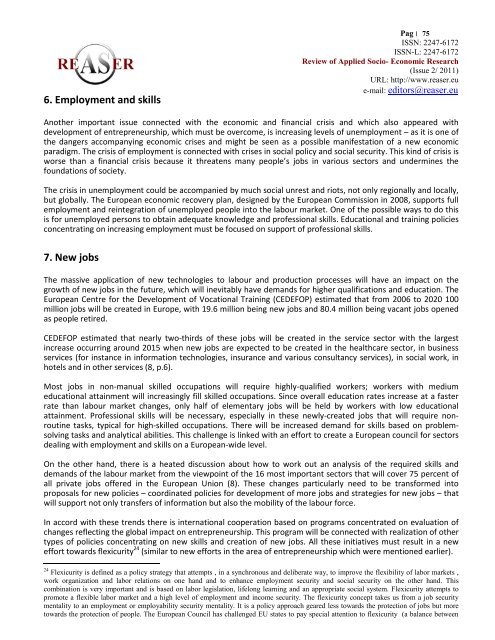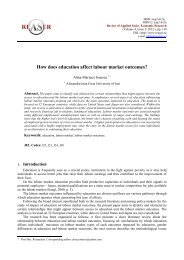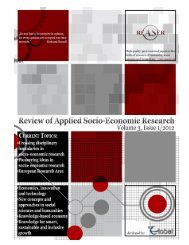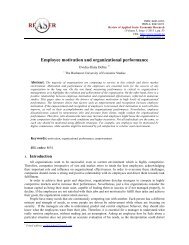Volume 2, ISSUE2/2011 - Review of Applied Socio-Economic ...
Volume 2, ISSUE2/2011 - Review of Applied Socio-Economic ...
Volume 2, ISSUE2/2011 - Review of Applied Socio-Economic ...
You also want an ePaper? Increase the reach of your titles
YUMPU automatically turns print PDFs into web optimized ePapers that Google loves.
6. Employment and skillsPag׀ 75 ISSN: 2247-6172ISSN-L: 2247-6172<strong>Review</strong> <strong>of</strong> <strong>Applied</strong> <strong>Socio</strong>- <strong>Economic</strong> Research(Issue 2/ <strong>2011</strong>)URL: http://www.reaser.eue-mail: editors@reaser.euAnother important issue connected with the economic and financial crisis and which also appeared withdevelopment <strong>of</strong> entrepreneurship, which must be overcome, is increasing levels <strong>of</strong> unemployment – as it is one <strong>of</strong>the dangers accompanying economic crises and might be seen as a possible manifestation <strong>of</strong> a new economicparadigm. The crisis <strong>of</strong> employment is connected with crises in social policy and social security. This kind <strong>of</strong> crisis isworse than a financial crisis because it threatens many people’s jobs in various sectors and undermines thefoundations <strong>of</strong> society.The crisis in unemployment could be accompanied by much social unrest and riots, not only regionally and locally,but globally. The European economic recovery plan, designed by the European Commission in 2008, supports fullemployment and reintegration <strong>of</strong> unemployed people into the labour market. One <strong>of</strong> the possible ways to do thisis for unemployed persons to obtain adequate knowledge and pr<strong>of</strong>essional skills. Educational and training policiesconcentrating on increasing employment must be focused on support <strong>of</strong> pr<strong>of</strong>essional skills.7. New jobsThe massive application <strong>of</strong> new technologies to labour and production processes will have an impact on thegrowth <strong>of</strong> new jobs in the future, which will inevitably have demands for higher qualifications and education. TheEuropean Centre for the Development <strong>of</strong> Vocational Training (CEDEFOP) estimated that from 2006 to 2020 100million jobs will be created in Europe, with 19.6 million being new jobs and 80.4 million being vacant jobs openedas people retired.CEDEFOP estimated that nearly two-thirds <strong>of</strong> these jobs will be created in the service sector with the largestincrease occurring around 2015 when new jobs are expected to be created in the healthcare sector, in businessservices (for instance in information technologies, insurance and various consultancy services), in social work, inhotels and in other services (8, p.6).Most jobs in non-manual skilled occupations will require highly-qualified workers; workers with mediumeducational attainment will increasingly fill skilled occupations. Since overall education rates increase at a fasterrate than labour market changes, only half <strong>of</strong> elementary jobs will be held by workers with low educationalattainment. Pr<strong>of</strong>essional skills will be necessary, especially in these newly-created jobs that will require nonroutinetasks, typical for high-skilled occupations. There will be increased demand for skills based on problemsolvingtasks and analytical abilities. This challenge is linked with an effort to create a European council for sectorsdealing with employment and skills on a European-wide level.On the other hand, there is a heated discussion about how to work out an analysis <strong>of</strong> the required skills anddemands <strong>of</strong> the labour market from the viewpoint <strong>of</strong> the 16 most important sectors that will cover 75 percent <strong>of</strong>all private jobs <strong>of</strong>fered in the European Union (8). These changes particularly need to be transformed intoproposals for new policies – coordinated policies for development <strong>of</strong> more jobs and strategies for new jobs – thatwill support not only transfers <strong>of</strong> information but also the mobility <strong>of</strong> the labour force.In accord with these trends there is international cooperation based on programs concentrated on evaluation <strong>of</strong>changes reflecting the global impact on entrepreneurship. This program will be connected with realization <strong>of</strong> othertypes <strong>of</strong> policies concentrating on new skills and creation <strong>of</strong> new jobs. All these initiatives must result in a neweffort towards flexicurity 24 (similar to new efforts in the area <strong>of</strong> entrepreneurship which were mentioned earlier).24 Flexicurity is defined as a policy strategy that attempts , in a synchronous and deliberate way, to improve the flexibility <strong>of</strong> labor markets ,work organization and labor relations on one hand and to enhance employment security and social security on the other hand. Thiscombination is very important and is based on labor legislation, lifelong learning and an appropriate social system. Flexicurity attempts topromote a flexible labor market and a high level <strong>of</strong> employment and income security. The flexicurity concept takes us from a job securitymentality to an employment or employability security mentality. It is a policy approach geared less towards the protection <strong>of</strong> jobs but moretowards the protection <strong>of</strong> people. The European Council has challenged EU states to pay special attention to flexicurity (a balance between








